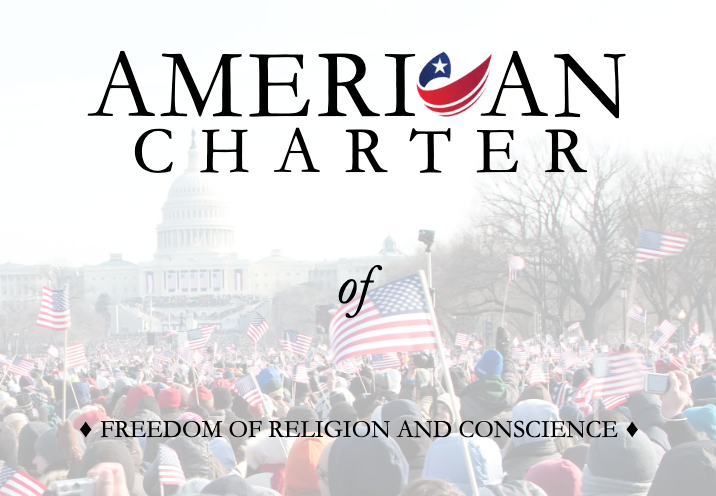By Nathan Berkeley
Independence Day is an occasion for reflecting on America’s imperfect yet extraordinary experiment in ordered liberty. And religious freedom, which America’s founders recognized as our “First Freedom,” remains integral to that experiment.
Several years ago, RFI brought together a diverse group of leaders and scholars across American religious and political life to produce the American Charter for Freedom of Religion and Conscience. The Charter’s aim was to “restore civility to public discourse on religion and freedom of religion and conscience in America [and] explore the meaning and value of freedom of religion and conscience as a foundation of American democracy…” While these aspirations seem harder to realize than ever, this important document is worth returning to. The introduction of the Charter states:
Aware of the historic significance of the right of freedom of religion and conscience in the story of liberty in our Republic, and of its promise as a key to human dignity and flourishing and to making our world more peaceful and secure, we publish this Charter to affirm this foundational right and its centrality to the American experiment. (pg. 4)
The authors also emphasize the Charter’s “special relevance to America,”
because the United States is—to borrow from Alexander Hamilton’s opening essay in The Federalist Papers—a nation founded on ‘reflection and choice’ rather than mere ‘accident and force.’ As such, America will always thrive or falter according to the strength of its commitment to its founding ideals and to perfecting our union. This Charter is also distinctively American because it springs from the United States’ commitment to freedom of religion and conscience—a commitment that is, at its heart, covenantal, based on a solemn and binding promise between citizens as embodied in the U.S. Constitution. (pg. 8)
As most Americans know (and many could still recite from memory), the Declaration of Independence made the momentous claim “that all men are created equal, that they are endowed by their Creator with certain unalienable Rights, that among these are Life, Liberty and the pursuit of Happiness.” The idea that human dignity is given by God equally to all is one of the most profound and revolutionary claims in history, and yet it sounds commonplace to our ears today. We can no longer pass by it so easily. We must rediscover its centrality to our common life and to our rich free exercise tradition. Along these lines, Article 2 of the American Charter states:
Freedom of religion and conscience is rooted in the inviolable dignity of each human being...Under the First Amendment, Americans have a civic obligation to recognize this right, not only for themselves, but for all people, including those with whom they deeply disagree.
On this 4th of July — amid an intensely divisive presidential campaign and seemingly endless cultural and legal battles throughout our society — may we consider anew the ways religious freedom provides a model for putting the Declaration’s claim of equal human dignity into practice in American life.
Learn more about the American Charter of Freedom of Religion and Conscience.
Nathan A. Berkeley is RFI’s Associate Vice President, U.S. Strategies and Communications.
THE RFI BLOG

Is Egypt’s Government Trying To Take Over Christianity’s Most Important Monastery?

Does Southeast Asia Lead the World in Human Flourishing?

RFI Leads Training Session on Religious Freedom Law and Policy for U.S. Army War College

Oral Argument in Charter School Case Highlights Unconstitutional Motives Behind OK Attorney General’s Establishment Clause Claim

Largest Longitudinal Study of Human Flourishing Ever Shows Religion’s Importance
CORNERSTONE FORUM

Reaffirming Religious Freedom: Bridging U.S. Advocacy and Iraq’s Constitutional Framework

Political Polarization, Same-Sex Marriage and Religious Liberty

Bridging the Gap Between International Efforts and Local Realities: Advancing Religious Freedom in the MENA Region

Challenges to Religious Freedom in Iraq and the Critical Need for Action


